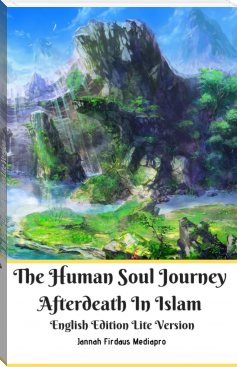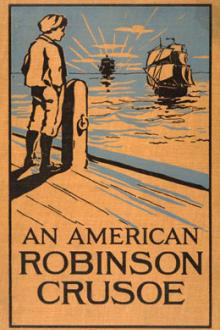Swiss Family Robinson, Johann David Wyss [tools of titans ebook txt] 📗

- Author: Johann David Wyss
- Performer: -
Book online «Swiss Family Robinson, Johann David Wyss [tools of titans ebook txt] 📗». Author Johann David Wyss
as the casks, in perfect security, after which we proceeded to a close
inspection of our prize.
Its enormous size quite startled my wife and little boy; the length
being from sixty to sixty-five feet, and the girth between thirty and
forty, while the weight could not have been less than 50,000 lbs.
The color was a uniform velvety black, and the enormous head about
one-third of the length of the entire hulk, the eyes quite small, not
much larger than those of an ox, and the ears almost undiscernable.
The jaw opened very far back, and was nearly sixteen feet in length,
the most curious part of its structure being the remarkable substance
known as whalebone, masses of which appeared all along the jaws, solid
at the base, and splitting into a sort of fringe at the extremity. This
arrangement is for the purpose of aiding the whale in procuring its
food, and separating it from the water.
The tongue was remarkably large, soft, and full of oil; the opening of
the throat wonderfully small, scarcely two inches in diameter.
`Why, what can the monster eat?’ exclaimed Fritz; `he can never
swallow a proper mouthful down this little gullet!’
`The mode of feeding adopted by the whale is so curious,’ I replied,
`that I must explain it to you before we begin work.
`This animal (for I should tell you that a whale is not a fish; he
possess no gills, he breathes atmospheric air, and would be drowned if
too long detained below the surface of the water); this animal, then,
frequents those parts of the ocean best supplied with the various
creatures on which he feeds. Shrimps, small fish, lobsters, various
molluscs, and medusae form his diet.
`Driving with open mouth through the congregated shoals of these
little creatures, the whale engulfs them by millions in his enormous
jaws, and continues his destructive course until he has sufficiently
charged his mouth with prey.
`Closing his jaws and forcing out, through the interstices of the
whalebone, the water which he has taken with his prey, he retains the
captured animals, and swallows them at his leisure.
`The nostrils, or blow-holes, are placed, you see, on the upper part of
the head, in order that the whale may rise to breathe, and repose on
the surface of the sea, showing very little of his huge carcase.
`The breathings are called “spoutings,” because a column of mixed
vapor and water is thrown from the blow-holes, sometimes to a height of
twenty feet.
`And now, boys,’ cried I, `fasten on your buskins, and let me see if
you can face the work of climbing this slippery mountain of flesh, and
cutting it up.’
Fritz and Jack stripped, and went to work directly, scrambling over the
back to the head, where they assisted me to cut away the lips, so as to
reach the whale bone, a large quantity of which was detached and
carried to the boat.
Ernest laboured manfully at the creature’s side, cutting out slabs of
blubber, while his mother and Franz helped as well as they could to put
it in casks.
Presently we had a multitude of unbidden guests. The air was filled by
the shrill screams and hoarse croaks and cries of numbers of birds of
prey; they flew around us in ever narrowing circles, and becoming
bolder as their voracity was excited by the near view of the tempting
prey, they alighted close to us, snatching morsels greedily from under
the very strokes of our knives and hatchets.
Our work was seriously interrupted by these feathered marauders, who,
after all, were no greater robbers than we ourselves. We kept them off
as well as we could by blows from our tools, and several were killed,
my wife taking possession of them immediately for the sake of the
feathers.
It was nearly time to leave the island, but first I stripped off a long
piece of the skin, to be used for traces, harness, and other
leather-work. It was about three-quarters of an inch thick, and very
soft and oily—but I knew it would shrink and be tough and durable.
I also took a part of the gums in which the roots of the baleen or
whalebone was still embedded, having read that this is considered quite
a delicacy, as well as the skin, which, when properly dressed and cut
in little cubes, like black dice, has been compared, by enthusiastic
(and probably very hungry) travellers, to cocoanut and cream-cheese.
The boys thought the tongue might prove equally palatable, but I
valued it only on account of the large quantity of oil it contained.
With a heavy freight we put to sea, and made what haste we could to
reach home and cleanse our persons from the unpleasant traces of the
disgusting work in which we had spent the day.
Next morning we started at dawn. My wife and Franz were left behind,
for our proposed work was even more horrible than that of the preceding
day; they could not assist, and had no inclination to witness it.
It was my intention to open the carcase completely, and, penetrating
the interior, to obtain various portions of the intestines, thinking
that it would be possible to convert the larger ones into vessels fit
for holding the oil.
This time we laid aside our clothes and wore only strong canvas
trousers when we commenced operations, which were vigorously carried on
during the whole of the day; then, satisfied that we could do so with a
clear conscience, we abandoned the remains to the birds of prey, and,
with a full cargo, set sail for land.
On the way, it appeared to strike the boys (who had made not the
slightest objection to the singularly unpleasant task I had set them)
as very strange that I should wish to possess what they had been
working so hard to procure for me.
`What can have made you wish to bring away that brute’s entrails,
father? Are they of any use?’
`There are countries,’ I replied, `where no wood grows of which to make
barrels, and no hemp for thread, string and cordage. Necessity, the
mother of all the more valuable inventions, has taught the inhabitants
of those countries, Greenlanders, Esquimaux and others, to think of
substitutes, and they use the intestines of the whale for one purpose,
the sinews and nerves for the other.’
We were right glad to land, and get rid, for the present, of our
unpleasant materials, the further preparation of which was work in
store for the following day.
A refreshing bath, clean clothes, and supper, cheered us all up, and we
slept in peace.
`Now for the finishing up of this dirty job,’ cried I, merrily, as we
all woke up next morning at daybreak. And after the regular work was
done, we commenced operations by raising a stand or rough scaffold on
which the tubs full of blubber were placed and heavily pressed, so that
the purest and finest oil overflowed into vessels underneath.
The blubber was afterwards boiled in a cauldron over a fire kindled at
some distance from our abode, and by skimming and straining through a
coarse cloth, we succeeded in obtaining a large supply of excellent
train oil, which, in casks and bags made of the intestines, was safely
stowed away in the `cellar’, as the children called our roughest
store-room.
This day’s work was far from agreeable, and the dreadful smell
oppressed us all, more especially my poor wife, who, nevertheless,
endured it with her accustomed good temper. However, she very urgently
recommended that the new island should be the headquarters for another
colony, where, said she, `any animals we leave would be safe from apes
and other plunderers, and where you would find it so very convenient to
boil whale-blubber, strain train oil, and the like’.
This proposal met with hearty approval, especially from the boys, who
were always charmed with any new plan; and they were eager to act upon
it at once. But when I reminded them of the putrefying carcase which
lay there, they confessed it would be better to allow wind and storms,
birds and insects to do their work in purging the atmosphere, and
reducing the whale to a skeleton before we revisited the island.
The idea of a rowing-machine kept recurring to my brain, and I
determined to attempt to make one. I took an iron bar, which when laid
across the middle of the boat projected about a foot each way. I
provided this bar in the middle with ribbed machinery, and at each end
with a sort of nave, in which, as in a cart wheel, four flat spokes, or
paddles, were fixed obliquely. These were intended to do the rowers’
part.
Then the jack was arranged to act upon the machinery in the middle of
the iron cross-bar, in such a way that one of its strong cogwheels bit
firmly into the ribs, so that when it was wound up, it caused the bar
to revolve rapidly, of course turning with it the paddles fixed at
either end, which consequently struck the water so as to propel the
boat.
Although this contrivance left much to be desired in the way of
improvement, still when Fritz and I wound up the machinery, and went
off on a trial trip across the bay, we splashed along at such a famous
rate, that the shores rang with the cheers and clapping of the whole
family, delighted to behold what they considered my brilliant success.
Everyone wanted to go on board, and take a cruise, but as it was
getting late, I could not consent. A trip next day, however, was
promised to Cape Disappointment and the little settlement of Prospect
Hill.
This proposal satisfied everybody. The evening was spent in preparing
the dresses, arms and food which would be required, and we retired
early to rest.
Intending to be out all day, the house was left in good order, and we
departed on our expedition, provided, among other things, with spades
and mattocks, for I wished to get young cocoanut trees and shrubs of
different kinds, that, on our way back, we might land on Whale Island,
and begin our plantation there.
We directed our course towards the opposite side of the bay. The sea
was smooth, my rowing-machine performed its work easily, and leaving
Safety Bay and Shark Island behind us, we enjoyed at our ease the
panorama of all the coast scenery.
Landing near Prospect Hill, we moored the boat, and walked through the
woods to our little farm, obtaining some fresh cocoanuts, as well as
young plants, on the way.
Before coming in sight of the cottage at the farm, we heard the cocks
crow, and I experienced a sudden rush of emotion as the sound recalled
in a degree painfully vivid, the recollection of many a ride and walk
at home, when we would be greeted by just such familiar sounds as we
approached some kind friend’s house. Here, but for the unconscious
animals, utter solitude and silence prevailed, and I with my dear
family, whose visit would have been hailed with delight in so many
homes, advanced unnoticed to this lonely cottage.
So long had been our absence that our arrival created a perfect panic.
The original animals had forgotten us, and to their progeny, lambs,
kids, and chickens, who had never seen the face of man, we seemed an
army of fierce foes.
The boys found it impossible to milk the goats, until, by the use of
the lasso, they captured them one after the other, bound





Comments (0)